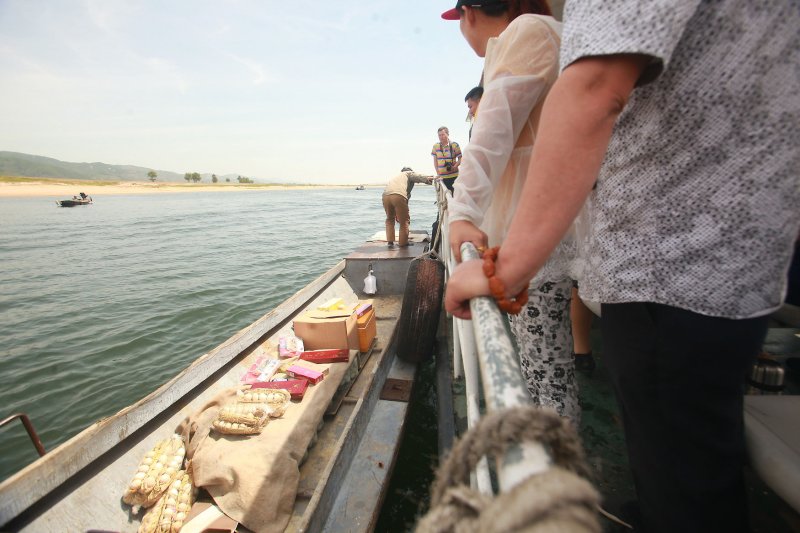A North Korean man sells contraband pickled eggs, cigarettes, alcohol and ginseng to Korean, Japanese and Chinese tourists on the Yalu River, north of Dandong, China’s larger border city with North Korea (background), in Liaoning Province, on May 29, 2015. Counterfeit cigarettes are an important revenue source for North Korea, and a Chinese national was extradited to the United States this week to faces charges over aiding Pyongyang in producing the contraband. File Photo by Stephen Shaver/UPI |
License PhotoOct. 1 (UPI) — A Chinese national was extradited from Australia to the United States this week to face charges related to North Korea‘s illicit counterfeit cigarette enterprise that funds the rogue state’s nuclear and weapons of mass destruction programs.
Jin Guanghua, 53, was accused in a 2022 indictment of erecting front companies in Dubai and elsewhere so tobacco companies owned by the North Korean military could purchase bulk tobacco in U.S. dollars through the U.S. financial system, in violation of U.S. sanctions.
The Chinese front companies, false shipping records and other deceptive means were employed to disguise the tobacco as being shipped to China as part of legitimate trade.
At least 310 such transactions worth some $74 million that would have been either frozen, blocked, investigated or declined were facilitated for North Korea by this scheme between February 2009 and March 2019, the indictment states.
Federal prosecutors allege that the scheme netted nearly $700 million for North Korea to apply toward its nuclear and ballistic weapons program.
Jin — who is facing numerous sanctions violations, bank fraud, money laundering and conspiracy charges — was arrested by Australian authorities at the request of the United States on March 23, 2023, as he attempted to depart the country for China.
He was extradited to the United States on Friday, the Justice Department said in a statement Monday.
A spokesperson for Australia’s Attorney-General’s Department confirmed to UPI in an emailed statement that it had surrendered Jin to the United States pursuant to Washington’s extradition request.
In response to UPI’s request for information concerning Jin’s detention, the department declined to comment.
“As the prosecution of the individual is now a matter for U.S. authorities, it would not be appropriate to comment further,” the spokesperson said.
Along with Jin, several others were charged in the 2020 indictment, including Sim Hyon-sop, a 50-year-old North Korean employee of Pyongyang’s state-owned and U.S.-sanctioned Foreign Trade Bank who is based in Dubai, and Chinese nationals Qin Guoming, 60, and Han Linlin, 41.
Federal prosecutors said Jin, Qin and Han were behind at least eight front companies.
If convicted, Jin faces a maximum penalty of 30 years in prison for bank fraud, 20 years in prison for sanctions violations and 20 years in prison for money laundering.
Counterfeit tobacco is an important revenue source for Pyongyang, with federal prosecutors stating it has been dealing in the illicit trade of fake cigarettes since at least 1992.
“Counterfeit cigarettes are a major source of income to the North Korean regime and may be the single most lucrative item in the North Korean portfolio, as smuggled tobacco is estimated to garner revenue as much as $20 on every $1 spent in cost,” the Justice Department said.
“North Korean tobacco sales are alleged to flow back to the North Korean government, including to slush funds designed to sustain the loyalty of a core of party elite and to underwrite weapons development programs.”
A report from the Washington-based Wilson Center think tank in 2005 said it may be North Korea’s “largest containerized export sector,” as a 40-foot container of counterfeit cigarettes might cost $70,000 to produce but have a street value of up to $4 million.

